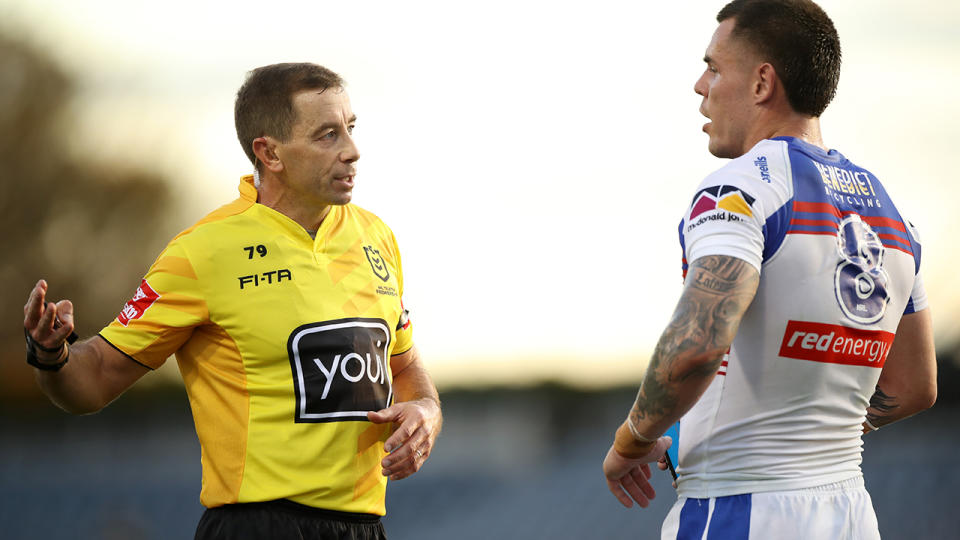'All this rubbish': Phil Gould and Paul Gallen in fiery on-air clash

Paul Gallen and Phil Gould have clashed on-air about the NRL’s new six-again rule.
Under the new rule, referees simply call six-again for ruck infringements rather than blow penalties, unless there have been multiple infringements in quick succession or they think there has been a deliberate act.
The league on Monday revealed a mammoth 31.2 increase in total play-the-balls per game in round three compared to the opening two rounds of the competition.
‘RESERVE GRADER’: Legend's ultimate insult for Ben Hunt
‘IT WAS WRONG’: Matty Johns apologises for Hitler joke
It resulted in an extra three minutes of ball in play and a spike in fatigue, prompting a climb in line breaks per game from 5.25 to eight.
Discussing the introduction of the new rule on 100% Footy on Monday night, Gallen and Gould disagreed about whether or not teams should still receive penalties for ruck infringements.
Gould praised the introduction of the new rule, pointing to the eradication of unwanted stoppages in the game.
However Gallen said it doesn’t make sense that a team would receive a penalty when in range of taking two points.
“The six-again is a great deterrent and it also reduces the number of stoppages and engagements we have during the course of the game,” Gould said.
“Every time there's a ruck penalty, Paul Gallen the captain, goes up and argues with the referee and stops the play and waits for his defence to get ready and wants to argue about the time before, all that has stopped.
“These committee meetings before they kick for touch, it's all stopped. The play keeps moving, we don't even go back to look at what the six-again was for. We're not even worried about it.”
However Gallen questioned why a team would be robbed of the chance to take two points late in a close game.
“I’m still concerned about the six-again. I agree with the one referee, absolutely brilliant the way they've done it, that's awesome,” he said.
“But the six-to-go rule is still at the discretion of the referee. Now at 20-all with a minute to go and 20m out in front of the post, why does a team not deserve a penalty in front of the post?”

Gould: Because the other team could have had three during the course of the game and kicked goals. It's the same rule for everybody.
Gallen: Why do they not deserve that?
Gould: It's the same for everybody. This is the new rule. This is the new interpretation. We're looking for play to be continuous. The discretion is not so much discretion over whether they give a penalty, it's whether or not it's been continuous, repeated or deliberate.
Gallen: How can you tell if it's deliberate?
Gould: Well, you've got to trust them to do it. That's what they're there for.
Gallen: That's a big ask. I just think it's too big an ask and too much pressure.
Gould: That's what they're there for!
Gallen: It's another bit of pressure they don't need.
Stats show increase in ruck infringements
Gould also said he was happy that the new rule took some focus off the speed of the play the ball.
“All this rubbish that we've heard, I've been hearing it for 25 years, it's about the speed of the play-the-ball being the be-all and end-all of coaching, the be-all and end-all of attacking football, the be-all and end-all of refereeing,” he said.
“As soon as we got there our game has been in trouble for 25 years. We've got to take the focus off that.
“We shouldn't be worried about play-the-ball speed, play-the-ball speed is a subjective thing.
“Even trying to measure it with stats the way they do these days, it's subjective and inaccurate.”
On Monday, NRL Head of Football Graham Annesley revealed 53 six-again rulings were made by referees over the weekend, an increase in average play-the-ball infringements.
But he said the referees were able to make those calls without having to stop play, or, even better, award a penalty at a crucial juncture of the match.
“One of the benefits of this rule is that the referees don't feel under the same pressure to award penalties or not award penalties,” Annesley said.
“Particularly in important parts of the field and important parts of the game where the awarding of a penalty may have an impact on the outcome.”
with AAP

